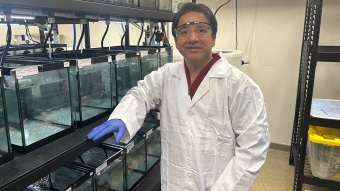
May 5, 2022
Contact: Brian Consiglio, 573-882-9144, consigliob@missouri.edu
Karry Weston, a nurse and doctoral student at the University of Missouri Sinclair School of Nursing, has worked in maternal child health for almost 20 years, helping to deliver babies and care for newborns. Among her main focusses are educating mothers about their newborns and postpartum care, including their decision to breastfeed or use formula.
While researching the benefits of breastfeeding, Weston discovered a lack of information involving mothers living in rural communities. Being from rural Missouri herself, Weston is passionate about educating women in rural areas about the benefits of breastfeeding to promote infant health.
“Research shows that across the United States, rural women breastfeed much less than both suburban women and urban women,” Weston said. “So, why is that? I feel like there has got to be something culturally about that, that is causing that decision, especially if we’re giving them the same education.”
To better understand the factors that may impact rural mothers’ decisions of whether or not to breastfeed their babies, the National Institutes of Health (NIH) and National Institute of Nursing Research (NINR) awarded Weston a $66,000 grant, which runs through March 2024.
“I want to look more at how being from a rural area, the way we are raised and the influences we have, how that eventually affects health care decisions,” Weston said. “In this case, I want to study the factors that may influence the choice to breastfeed your newborn or formula feed your newborn.”
Weston said while formula is a safe, healthy and convenient option, studies show natural breastfeeding is linked to numerous health benefits for both mother and child, which includes improving the mother’s recovery after giving birth. In addition to being packed with nutrients and strengthening the baby’s immune system, breastmilk also may help lower the baby’s risk of developing obesity and diabetes.
With the help of the grant, Weston plans to interview at least 30 rural Missouri mothers, with the goal of finding women with a wide variety of perspectives about the feeding choices for their newborns. The Women, Infants and Children (WIC) clinic in Moberly, Missouri, is supporting the grant and will help Weston recruit mothers for her research.
“I feel that as health care professionals, we cannot create interventions or education until we truly understand the culture,” Weston said. “I live in a rural community, so these are my people. I understand that sometimes there’s a different dynamic, too, on the way things are done and the way people make decisions. So, I think it would really help researchers to look more into that.”
Weston hopes with the help of this grant, she can improve the understanding of rural communities for the entire health care industry, not just maternal care.
“I feel like we need to tailor our resources and our approach with rural communities,” Weston said. “This type of research could translate beyond breastfeeding one day. It could potentially translate to diabetes research or to cardiac health research. It could really go anywhere — I’m just starting with breastfeeding.”
Weston is mentored by Linda Bullock of the MU Sinclair School of Nursing and Kevin Everett of the MU School of Medicine.



